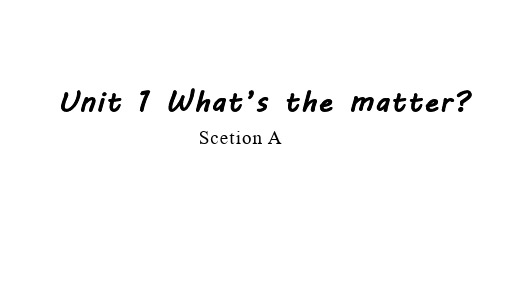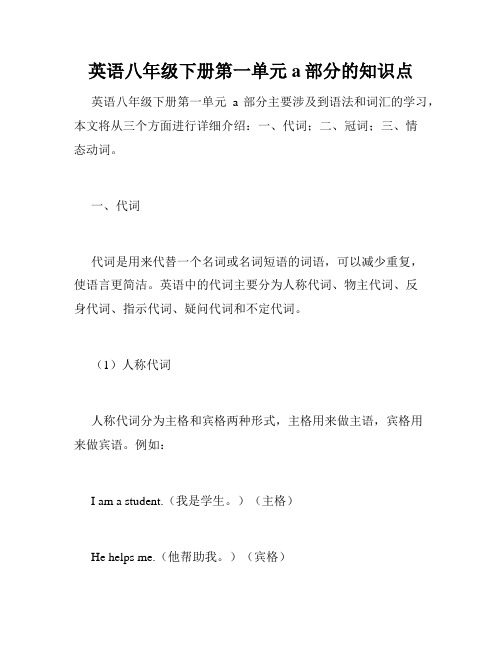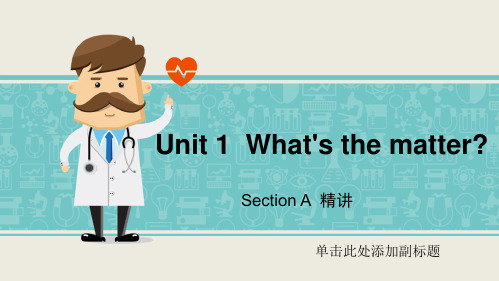人教版英语八年级下册Unit1 SectionA 教材知识详解
- 格式:doc
- 大小:11.93 MB
- 文档页数:6

Unit1 名师教材解读1. Textbook Analysis教材解读本单元以“健康与急救(Health and first aid)”为话题,围绕健康问题,学会表达伤病疼痛,正确地给予急救建议。
Section A在内容上侧重健康问题,从身体部位的名称,伤病名称的词汇入手,句型上把握“What’s the matter (with...)? I have a cold/fever/...”。
语法上重点突出表达身体不适的句型结构,包括学会使用含有动词have, hurt的表达方式及情态动词should表达建议。
在情感态度方面,3a-3c 部分利用公交司机停车救人的故事来发展学生阅读技能,扩展学生学习相关语言表述的同时,通过课堂讨论进行情感态度价值观的教育。
Section B在话题上,从Section A中侧重围绕健康问题谈论疾病及不适转向对事故伤害,急救(first aid)的讨论。
在语言上,进一步综合训练和巩固Section A中所学语言重点,但是更加丰富了词汇及相关表述。
按照教材内容,也可以特别对急救的步骤和顺序进行训练。
在技能上,综合了听说能力,突出阅读训练。
在教学策略上,要引导学生利用作者对事件先后顺序的发展描述来理解整篇内容。
在情感上,引导学生学会面对生活中的困难及陷入困境时,要坚强、独立、勇敢、果断、理智。
像Section B长文章中的主角一样,树立抓住哪怕是一丝希望也永不言放弃的精神,热爱生活,珍惜生命。
1.1Section A 1a 活动1a是Lead-in部分。
旨在通过复习绝大部分学生以前学习过的关于身体各部位的词汇,为下面的身体不适的表达法做准备。
学生对本部分词汇有一定的基础,可通过直观手段学习该部分的词汇,对发音做纠正。
如果部分词汇有困难,教师及时处理这部分后,即可过渡到身体不适的表达,从已知到新知。
1.2Section A 1b-1c 活动1b-1c是Listening and speaking部分。



英语八年级下册第一单元a部分的知识点英语八年级下册第一单元a部分主要涉及到语法和词汇的学习,本文将从三个方面进行详细介绍:一、代词;二、冠词;三、情态动词。
一、代词代词是用来代替一个名词或名词短语的词语,可以减少重复,使语言更简洁。
英语中的代词主要分为人称代词、物主代词、反身代词、指示代词、疑问代词和不定代词。
(1)人称代词人称代词分为主格和宾格两种形式,主格用来做主语,宾格用来做宾语。
例如:I am a student.(我是学生。
)(主格)He helps me.(他帮助我。
)(宾格)人称代词的主格和宾格形式不同,需要根据具体语境进行正确的使用。
(2)物主代词物主代词用来表示所属关系,分为形容词性和名词性两种形式。
例如:This is my book.(这是我的书。
)(形容词性)The book is mine.(这本书是我的。
)(名词性)(3)反身代词反身代词用来表示动作的反向,主要分为单数和复数两种形式。
例如:He hurt himself.(他伤害了自己。
)(单数)They hurt themselves.(他们伤害了自己。
)(复数)(4)指示代词指示代词用来指示某一个东西或人,主要分为this、that、these 和those四种形式。
例如:This is my bag.(这是我的书包。
)(单数)Those are my shoes.(那些是我的鞋子。
)(复数)(5)疑问代词疑问代词用来引导疑问句,主要分为what、who、which、whom、whose和where六种形式。
例如:What do you like to eat?(你喜欢吃什么?)Who is he?(他是谁?)(6)不定代词不定代词指代数量不确定的对象或人,分为some、any、many、few、several、both等形式。
例如:There are few students in the classroom.(教室里有很少的学生。


八年级下册Unit1 3a-3c知识点总结1.a.m.上午 p.m.下午2.过去进行时:was/were + v-ing3.see-saw-seensee sb. doing sth. 看见某人正做某事see sb. do sth. 看见某人做了某事(强调全过程或经常发生)4.on the side of the road 在路边5.shout for help 呼救6.基数词-year-old 形容词,“...岁的”,用在名词前基数词 years old “...岁”,用在系动词后7.think twice 再三考虑,慎重考虑 think about 考虑8.大交通工具: get on 上车,get off 下车小交通工具:get into 上车, get out of 下车9.happen①Sth. happen(s) + 地点/时间. 某时/某地发生某事。
②Sth. happen(s) to sb. 某人发生了某事。
(不好的事)③Sb. happen(s) to do sth. 某人碰巧做某事。
④It happens + that从句. 碰巧...10.have a heart problem 有心脏病11.act quickly 迅速行动副词修饰动词12.take sb. to sp. 带某人去某地13.expect预计,期望①expect sb. to do sth. 预料/期待某人做某事②expect to do sth. 预料/期待做某事③expect that从句预料...14.wait for 等待15. to one’s surprise 使某人惊讶的是to one’s joy 令某人高兴的是to one’s disappointment 令某人失望的是to one’s satisfaction 令某人满意的是扩展: get a surprise 吃惊 in surprise 惊讶地16.agree 同意①agree to do sth. 同意做某事②agree with sb. 同意某人(意见/观点)③agree to + 建议/计划/安排④agree on sth. 就某事达成一致17.thanks to = with the help of = because of由于;多亏;因为(作状语,常用于句首)thanks for 因...而感谢18.in time 及时; on time 准时19.It’s said that从句据说...20. (be)in trouble处于困境中trouble get into trouble 陷入困境have trouble (in) doing sth. 做某事有困难21.save a life 挽救生命22.hit-hit-hithit sb. in the + 身体较软或凹陷的部位打在(脸/眼睛/嘴/肚子/...)上hit sb. on the + 身体较硬或凸出的部位打在某人的(头/鼻子/后背/...)上23.right away = at once = right now 立即;马上24.到达某地arrive in + 大地方arrive at + 小地方get to + 地点reach + 地点。
八年级下册人教版英语第一单元3a知识点在八年级下册人教版英语第一单元3a的学习中,我们需要掌握以下几个知识点:1. 一般现在时态一般现在时态表示经常发生的动作,习惯或者事实。
它的构成是:主语+动词原形(第三人称单数加s)。
例如:He usually goes to school by bus.(他通常乘公交车上学。
)2. 一般过去时态一般过去时态表示过去某个时间发生的动作或者事件。
它的构成是:主语+动词过去式。
例如:I watched TV last night.(我昨晚看电视了。
)3. 句子的基本结构英语句子的基本结构是:主语+谓语+宾语。
其中,主语通常是表示动作的人或物;谓语是说明主语动作或者状态的动词;宾语是接受动作的人或物。
例如:She eats an apple.(她吃了一个苹果。
)4. 形容词和副词的用法形容词用来描述名词或代词的特征或状态,放在名词或代词之前。
例如:The tall boy is my brother.(那个高个子的男孩是我弟弟。
)副词用来描述动词、形容词或其他副词的状态或特征,放在所修饰词的后面。
例如:She sings well.(她唱歌唱得很好。
)5. 物主代词的用法物主代词用来代替名词或代词所表示的人或物的所有格,分为形容词性物主代词和名词性物主代词。
形容词性物主代词用来修饰名词,放在名词之前;名词性物主代词则直接代替名词。
例如:She is my sister.(她是我的妹妹。
)以上就是八年级下册人教版英语第一单元3a知识点的简要介绍,希望能够对同学们的英语学习有所帮助。
当然,光掌握这些知识点还不够,还需要在实际学习和应用中不断去巩固和提高自己的语言技能。
鼎力教育八年级小班课外辅导曾老师Unit 1 what’s the matter (Section A)教学目标:1语言目标:描述健康问题的词汇,及如何根据别人的健康问题提建议。
2 技能目标:能听懂谈论健康问题的对话材料;能根据别人的健康问题提建议;能写出重点单词和重点句型,并能描述怎样对待健康问题。
3 情感目标:通过开展扮演病人等活动,培养学生关心他人身体健康的品质。
通过本课的阅读,培养学生处理紧急事件的基本能力,树立紧急事件时互相帮助的精神。
教学重点:掌握关于身体部位的单词以及词组;会使用以下句型:What’s the matter with…?”“What should I/ you/ he/ she/they… do?”“I/ you/ he/ she/they sh ould do…”教学难点:should 的用法;运用推理判断法解阅读理解题。
Review(复习)身体部位的单词1、头_______; 8、脚________;2、眼睛_______; 9、脖子_______;3、鼻子_______; 10、脚(单数)______(复数)_______4、嘴巴_______; 11、胃_________;5、耳朵_______; 12、身体________;6、脸_______; 13、牙齿(单数)________; (复数)7、手_______; 14、手臂________一单词学习UNIT 1 1.matter [ˈmætə] v. 重要,要紧,有关系 2.What’s the matter? 怎么了?出什么事了?3.sore [sɔ:(r)] adj. 疼痛的,酸痛4.have a cold 感冒5.stomach ['stʌmək] n. 胃,腹部6.stomachache ['stʌməkeɪk] n. 胃痛,腹痛7. have a stomachache 胃痛8.foot(复数feet) [fu:t] n. 脚9.neck [nek] n. 颈,脖子10.throat [θrəʊt] n. 喉咙11.fever ['fi:və] n. 发烧,12.ie [laɪ] v. 躺,平躺13、lie down 躺下14、rest [rest] n. 剩余部分,其余;放松,休息15、cough [kɒf] n. & v. 咳嗽16、X-ray ['eksreɪ] n. X光,X射线17、toothache [ˈtu:θeɪk] n. 牙痛18、take one's temperature 量体温19、headache [ˈhedeɪk] n. 头痛20、have a fever 发烧21、break [breɪk] n. & v. 休息,暂停;打破22、take breaks(take a break)休息23、hurt [hə:t] v. 伤害,损害,使受伤24、passenger ['pæsɪndʒə] n. 乘客,旅客25、off [ɒf] adv. prep. 离开(某处);从…去掉26、get off 下车27、to one's surprise 使…惊讶,出乎…意料28、onto [ˈɒntə] prep. 向,朝29、trouble [ˈtrʌbl] n. 麻烦,烦扰,问题30、hit [hit] n. & v. 碰撞,打,打击31、right away 立即,马上32、get into 陷入,参与33、herself [hə:ˈself] pron. 她自己,她本身(she的反身代词)二、短语的学习(翻译成中文)have a stomachache__________ have a cold _________lie down ____________ take one’s temperature ________have a fever _____________ go to a doctor______________to one’s surprise ___________ agree to (do sth.)_____________get into trouble___________句子: 1 .What’s the matter? I have a stomachache. You shouldn’t eat so much next time.2.What’s the matter with Ben?3. He hurt himself. He has a sore back.He should lie down and rest.4.Do you have a fever? Yes, I do. No, I don’t. I don’t know.5. Does he have a toothache? Yes, he does.He should see a dentist and get an X-ray.6.What should she do? She should take her temperature.7.Should I put some medicine on it? Yes, you should No, you shouldn’t.教学难点:掌握情态动词should \shouldn’t.的用法;学习have的用法。
Unit1 SectionA 教材知识详解1. What’ s the matter ? 怎么啦?出什么事情了?该句型是询问某人有什么病或某人遇到什么麻烦、问题,其后跟询问对象时,与介词with连用。
如:—What’s the matter with you ?你怎么了?— I have a bad.我感冒了。
(1) What’ s the matter with…?= What’s the trouble with…?= What’ s wrong with…?2. I have a cold 我感冒了have a/an + 疾病名词“患……病” (cold/fever/cough)如:have a sore throat 患喉咙痛have a sore back 患背痛have a fever 发烧have a cold =catch a cold 患感冒have a stomachache 患胃痛have a toothache患牙痛have a headache 患头痛have a backache患背痛3. She talked too much yesterday and didn’t drink enough water.她昨天说话太多了并且没有喝足够的水。
(1)辨析:too much/too many/much too短语含义用法例句too much太多后接不可数名词There is too much rain these days修饰动词,放在动词之后Watching TV too much is bad foryour eyes.too many太多后接可数名词复数There are too many things for me todo every day.much too太修饰形容词或副词It’s much too cold in winter.(2)enough①adj.足够的,充分的,修饰名词时,可放在名词之前,enough time②adv. “足够地,十分,相当”,修饰adj./adv,放在adj./adv 后,如:expensive enough4. drink some hot tea with honey. 喝一些加蜂蜜的热茶。
with的用法:①prep“具有,带有”,表示某物带有或具有某种特征。
如:She is a girl with long hair.②prep. 和......一起。
如:I like to talk freely with my friends.③prep 用......,表示“使用某种工具”。
如:Cut it with a knife.5. see a dentist and get an x- ray看牙医并且拍张x光see a dentist = go to a dentist看牙医see a doctor = go to a doctor 看医生6. What should she do? 她该怎么办呢?should “应该” 情态动词,后跟动词原形,表示责任和义务,should not =shouldn’t 不应该;主语+ should/ shouldn’t +动词原形。
如:You should lie down and rest. 你应该躺下休息一会儿。
You shouldn’t go out at night.你晚上不应该出去。
7. No, it doesn’t sound like you have a fever. 不需要,听起来你不像发烧了。
sound like 听起来像,后接名词或名词性短语作表语。
如:It sounds like a good idea.感官动词+ like:feel like 摸起来像smell like 闻起来像look like 看起来像taste like 尝起来像8. You need to take break away from the computer.你需要远离电脑,休息休息。
need v 需要◆用于肯定句是实意动词(1) need sth 需要某物,如:I need your help.(2)人做主语,sb need to do sth 某人需要做某事如:Do you need to drink more water?(3)物做主语,sth need doing sth = sth need to be done如:My TV set needs repairing.9. If your head and neck still hurt tomorrow, then go to a doctor.如果你的头和脖子明天还疼的话,就去看医生。
hurt 使痛,受伤;表示肉体感到疼痛或不适,使用时应用疼痛的具体部位作主语。
如:My leg hurts.10. At 9:00 a. m. yesterday, bus No. 26 was going along Zhonghua Road when the driver saw an old man lying on the side of the road.昨天上午9:00,26路公共汽车正沿着中华路行驶,这时,司机看见一位老人躺在马路上。
①辨析:along,down相同点:prep “顺着;沿着”。
不同点:along强调顺着水平方向。
down 指“沿着……下坡或者往南走”。
②see (saw , seen) v 看见see sb. do sth 看见某人做某事(看到动作发生的全过程或经常看到动作发生)。
see sb. doing sth 看见某人正在做某事(强调动作正在发生)。
如:Seeing their teacher walking into the classroom, they stopped talking at once.11. The bus driver, 24-year-old Wang Ping, stopped the bus without thinking twice.公共汽车司机,24岁的王平,毫不犹豫的停下了车。
24-year-old 24岁的;“数词+名词+形容词”构成复合形容词,在句中作定语,用连字符后连接,名词用单数。
如:Tom, a five-year-old boy, is the only child of the family.12. But to his surprise, they all agreed to go with him.但令他吃惊的是,所有的乘客都同意和他一起去医院。
(1) to one’s surprise 使某人吃惊的是……如:To my surprise, he got the first prize in the exam.surprise v 使吃惊→surprising adj. 令人吃惊的→surprised adj. 吃惊的in surprise 吃惊地surprise sb 使某人吃惊be surprised at 对……感到吃惊be surprised to do sth 做某事而感到惊讶be surprised + that从句因...而惊讶(2)agree v 同意→ (反)disagree不同意;agree with sb. 同意某人;agree to do sth 同意做某事如:I agree with you.13. Thanks to Mr. Wang and the passengers, the doctor saved the man in time.多亏了王先生和乘客的帮助,医生及时挽救了那位老人的生命。
(1)thanks to 多亏;由于①thanks to为习语介词,thanks不可以改为thank you,to后也不接动词原形,这个短语表示原因,意为“由于”、“多亏”,to表示感谢的对象。
②thanks for…,意为“因……而感谢”,for强调为何而感谢,其后可接名词或v-ing,thanks相当于thank you。
如:Thanks to the teacher, I’ve made great progres s.(2)on time 准时,in time 及时。
on time= at exactlythe right time.准时(在规定的时间之内)强调与某个时刻一致in time = with enough time to spare/ not late 及时(恰在时间点上)表示动作在规定时间内或比规定时间提前发生She didn’t catch the on time, so she couldn’t arrive there in time.和time有关的短语:at times=sometimes 有时have a good time 玩得高兴have time =be free 有空all the time 一直at the same time 同时by the time 到……时候for the first time 第一次14. But the driver didn’t think about himself.但是这位司机完全没有考虑他自己。
think about 考虑;认为与think有关的短语:think about 考虑think of 想起think over 仔细考虑think up = come up with 想出【谚语】Think before you act 三思而后行15. Do you agree that people often do not help others because they do not want to get intotrouble?人们常常不去帮助别人是因为他们不想惹麻烦?trouble n .问题;苦恼,有关trouble的短语:get into trouble造成麻烦(或烦恼)be in trouble 处于困境中have trouble (in) doing sth做某事有困难16. Did you fall down ?你跌倒了吗?fall → fell → fallen v 落下,跌落;fall down 摔倒,后接宾语时,应加上介词from。
如:She fell down from her bike.有关fall的短语:fall off 指从某物上跌落下来。
fall into 落入fall behind 落后fall in love with sb. 爱上某人fall asleep 入睡。